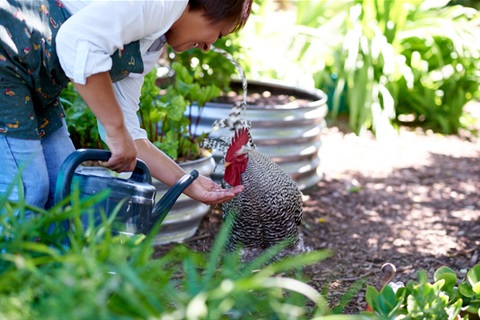Keeping backyard chickens

The following information is from the State Government's Department of Health & Human Services Food Safety Unit fact sheet on keeping backyard chickens.
Staying healthy
Keeping chickens as pets, can be a rewarding experience, especially for children. However, chickens and other poultry can carry germs such as Salmonella, which can lead to gastroenteritis in people, even when they appear healthy and clean. These germs are found in the chickens’ faeces (poo) which can contaminate the feathers of the chickens, the environment they live in and have access to, and the outside surface of the eggs that they lay. Follow these simple steps to reduce the chances of you or your family from becoming sick.
- Wash your hands thoroughly with soap and water after touching chickens, collecting eggs, handling nesting material or after contact with chicken litter/manure, and before eating or drinking. Adults should supervise handwashing by young children.
- Supervise young children closely when they are around chickens to make sure they do not cuddle or kiss the chickens, let the chickens touch their face, or put their unwashed hands in their mouths.
- Have a dedicated pair of shoes or boots to wear inside the chicken enclosure and don’t wear these shoes or boots inside your house. Clean and disinfect these shoes or boots regularly.
Egg safety
To avoid gastroenteritis from eggs at home, follow these safety tips:
- Discard cracked, damaged or heavily soiled eggs. Lightly soiled eggs should be cleaned with a dry cloth or a tissue. Never wash your eggs with water as it makes them porous and bacteria on the outer egg surface can penetrate the shell and contaminate the internal contents of the egg.
- Always store eggs in the fridge in clean packaging material that is labelled with a date they were laid, as eggs will keep for six weeks. • When storing, handling and preparing eggs, take the same precautions as you would with chicken, meat, seafood or dairy products.
- Thoroughly cook eggs and food containing eggs until they are hot all the way through.
- Don’t consume uncooked foods that contain raw eggs (for example, uncooked cake batter). Consider alternative, safer recipes, especially when serving food to infants, the elderly, and those with a medical condition which impairs the immune systems.
Can I keep chickens in my backyard?
In Victoria, most councils have local bylaws limiting the number of poultry that can be kept on a property. Some councils also have restrictions or regulations relating to construction of chicken housing. You may require a permit.
You can keep chickens or ducks in Yarra Ranges provided you meet the requirements of our Local Laws.
Purchasing chickens
When purchasing chickens, it is best to purchase vaccinated birds from a reliable commercial source. A good starter flock usually consists of birds 16-24 weeks old and four to five birds will usually produce enough eggs for a household.
Chicken housing
Ensure your chicken house and chicken run are fox proof. Fully enclose the chicken run with wire mesh buried into the soil at a depth of 50 cm to prevent foxes from digging under the fence. Cover the floor of the chicken house and the nesting box with sawdust or straw to a depth of 8cm so that it mixes with the poultry droppings to form a litter. This litter can be removed and composted. Ensure the chicken house is adequately ventilated and positioned to protect against prevailing winds and rain. Providing vegetation along the fencing can assist with wind protection.
Feeding your chickens
It is important to feed your chickens with appropriate food and clean water, refreshed regularly. Commercial layer pellets provide a balanced source of the correct nutrients. Kitchen scraps can also be given to chickens to supplement their diet. Avoid giving them chocolate, onions and garlic as these can sometimes cause health problems. Use a chicken feeder that is vermin and wild-bird proof to prevent them from eating the chicken feed and contaminating it. Don’t feed your birds mouldy feed.
Chicken health
Like all animals, chickens can experience health problems. Check your chickens regularly to ensure they are alert, active, eating well, have clean eyes, and nostrils and have noiseless breathing. If you are concerned, consult a vet to assist you with diagnosing and treating any health issues. Information about diseases of backyard chickens can be obtained from the following agriculture.vic.gov.au